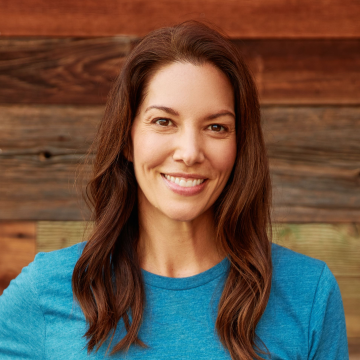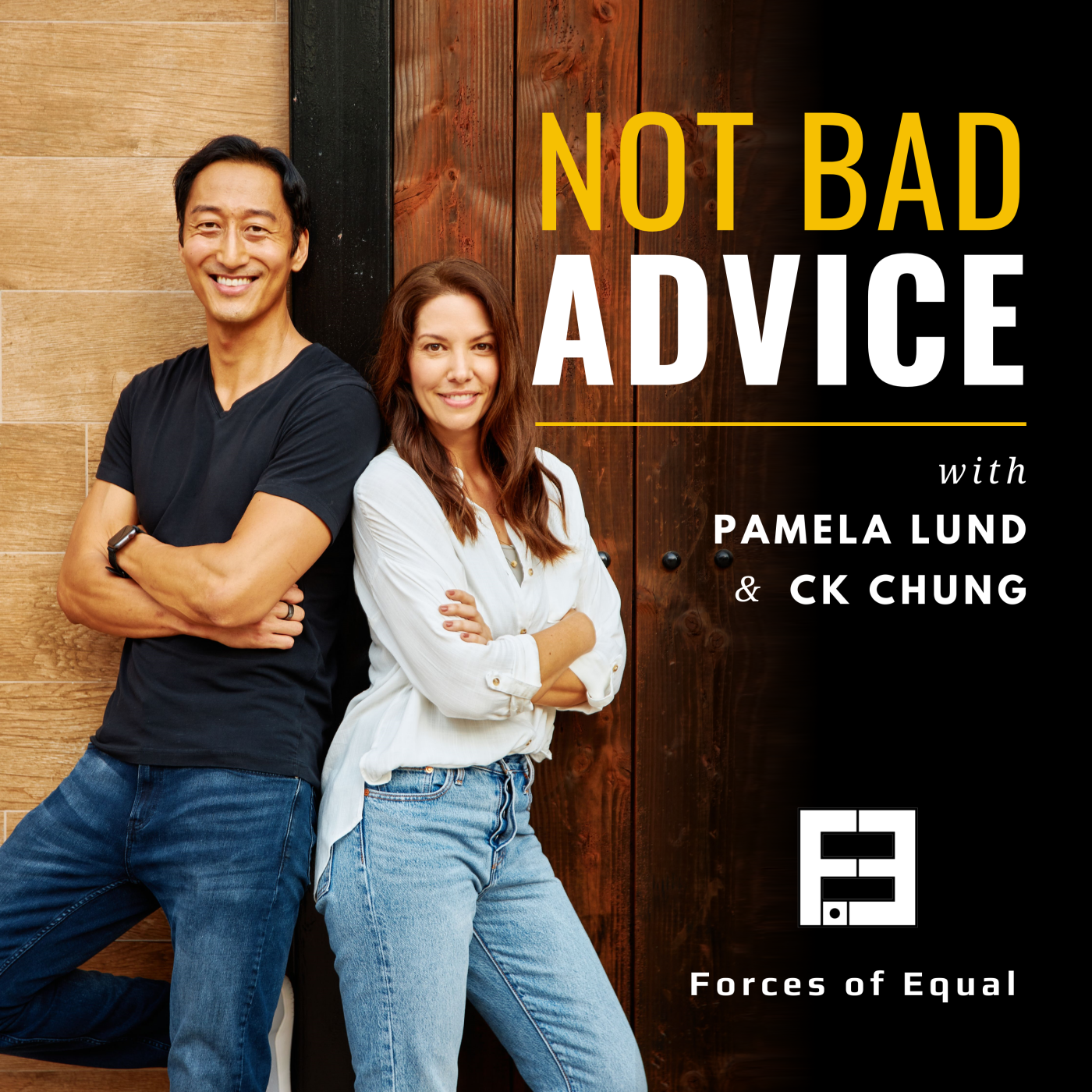Have you tried and failed at budgeting in the past? Chances are the system is what failed, not you. Listen to discover why most budgets suck and how you can do it better.
Ready to feel like you’re not bad with money? Visit NotBadWithMoney.com to learn about our financial coaching service that’s mostly practical and a little magical.
Got something you need advice about? Ask us here: ForcesOfEqual.com/Advice/
Transcript
Pam: [00:06] You’re listening to Not Bad Advice where our goal is to offer perspective that helps you improve one aspect of your life at a time.
[00:12] I’m Pamela Lund.
CK: [00:14] And I’m CK Chung.
Pam: [00:19] And we hope that after listening, you’ll think, “Hey, that’s not bad advice!”
[00:26] We’re almost done with our series of episodes on money and budgets. If you haven’t listened to the previous four episodes, queue them up for your next podcast-bingeing session. They’ll help you put what we talk about today into practice, but you don’t need to listen to them before you listen to this one.
[00:54] If you want a supercharge your budget and uncover your money blocks in a supportive environment, we’re also accepting clients for Not Bad With Money coaching – a one-on-one personalized money and budget coaching program that will help you feel calmly in control of how money flows through your life. Visit NotBadWithMoney.com or click the link in the show notes, if you’re ready to feel like you’re not bad with money.
[01:24] Budget is a bad word to a lot of people. It’s like diet – it represents restriction and denial of pleasure. It’s like a short-term punishment that you put yourself through just to get to a goal, but it doesn’t have to be. And really shouldn’t be that way. When you budget the right way, you take the stress and anxiety out of money and actually create freedom to use money in a way that makes you happier.
[01:49] Rather than feeling restricted and deprived, you feel free to buy things because you know you have money set aside for them. You don’t have to feel guilty about buying yourself something you want because you know you’ve already got your needs covered and your incremental goals met.
[02:04] I get pretty excited talking about this topic because, well, I’m a dork. But also because it’s a revolutionary way to think about budgeting, and it will completely change the way you think about money. Ready?
[02:14] Let’s do it!
[02:15] Let’s first talk about how people usually budget and why it doesn’t work. Now, maybe you’ve used a spreadsheet or a tool like Mint to track money in and money out and called that budgeting. It’s not budgeting, it’s just tracking, but it’s better than nothing.
[02:34] Then, maybe you’ve gone a step further and tried to estimate your expenses at the beginning of the month to create a budget. More than likely your budget was based on some ideal and completely unrealistic version of yourself that you could never live up to.
[02:49] Then the next month, when you look back at how well you stayed on budget and saw that you blew it, you gave up and said, “Well, budgeting doesn’t work,” or maybe that you’re not even capable of following a budget. That sound familiar?
[03:02] The problem here, wasn’t you. And the problem wasn’t budgeting itself. The problem was the system . When the system is broken, you can’t succeed no matter how hard you try. But this broken system is the only one most of us are taught, if we’re taught about money at all. And I’m on a mission to change that. So let’s talk about a better system.
[03:24] When I say “system,” I don’t mean the actual software that you use. You can use whatever you want though. You’ll hear me talk a lot about a tool called You Need a Budget, or YNAB for short, which I think is the best budgeting tool available. They don’t sponsor us, and this is not an ad. I’m just a happy customer. And I gift a subscription to all of our Not Bad With Money coaching clients, because I believe in it so much.
[03:48] So when I say you need a better system, I mean the philosophy behind how you’re budgeting. I mean the mindset and awareness topics we’ve covered in the last few episodes. And I mean, being realistic.
[03:59] If your budget isn’t realistic, it’s just not going to work. If I asked you to jump 20 feet in the air, you couldn’t, no matter how hard you try, because it’s not realistic. When you set up a budget that leaves no room for discretionary spending or that’s so strict you can’t adjust when life happens, you won’t be able to use it. Just like you can’t jump 20 feet.
[04:22] When you set up a new budget, rather than guessing at what you’re going to spend, you should download at least three, if not six months worth of transactions and categorize them to see what you really spend on average. And this is also helpful so that you can see irregular expenses that are coming up so you can start saving for them now.
CK: [04:41] But if I’m setting up a budget, I want to find out where I can change my spending, not keep spending the same way, right?
Pam: [04:49] Maybe, but the reality is that you’re not going to change overnight. If you try to stop spending money arbitrarily or restrict yourself too much, you’ll either feel deprived and angry about being on a budget or you’ll spend the money anyway, and your budget will be meaningless. So you have to start with a baseline.
[05:08] And once you know how much you usually spend on a category, you can start with that as your target budget for the next month, as long as it’s not more than your income, of course, because you don’t want to create more debt.
[05:19] Now at this point, I usually have clients just spend the way they normally do for the next month, but get in the habit of tracking their expenses on a daily or weekly basis, depending on how frequently they make purchases. And usually the simple act of seeing the money go out in real time is enough to result in a reduction in spending without any additional intervention.
[05:39]CK: It always comes back to awareness.
Pam: [05:41] Exactly. So then after a month of tracking, we take that awareness to the next level and look at where you spend money that you feel guilty about, where you wish you didn’t spend as much, or where you under-budgeted.
[05:53] And this is where we get into the psychology of money and where we need to understand the topics we covered on our recent episodes about financial values, money stories, and how money makes you feel. By understanding all of those motivations and how they work together, you can start to craft a budget that meets all of your emotional needs while achieving your longer term goals. You start to look at where you spend more money than you want to and ask if you’re buying things to meet an unfulfilled, emotional need.
[06:23] For example, are you eating a lot of takeout because you’re stressed out and you can mentally check out when you eat comfort food? Or are you buying a lot of clothes that you don’t need because they make you feel more confident for a little while? Or do you buy gifts for other people because you think that that makes them love you or feel loved by you?
[06:43] There are countless ways that we fulfill emotional needs by spending, and these are just a few examples. But when you track your expenses, you can start to see clear patterns and dig into the why behind them. Then you need to find ways to fulfill the actual emotional need so you can reduce how much you spend. And that’s the harder piece, and it’s completely unique to you in your situation, but it’s important to the process, and it’s where budgeting becomes freeing instead of restricting.
[07:11] Now on the other hand, you might look at what you spend and say, “Nope, it’s fine the way it is, I’m going to keep spending that much.” And that’s fine. This is where the realistic part comes in.
[07:19] If you know that you’re going to spend $300 on takeout every month, then budget $300 for takeout. Don’t say that you’re not going to get takeout and then spend $300 on credit because you didn’t plan for the expense.
CK: [07:33] If you lie about your budget, you’re just lying to yourself. So what’s the point.
Pam: [07:36] Well, we all want to imagine that we’re better versions of ourselves than we really are, or that we can do more than we can really do. If we go back to the diet analogy, it’s like starting a super low calorie diet and a five day a week fitness routine. You think that you’re going to be able to do that – just like you think that you’ll stick to an idealized version of your budget – but you won’t. You just can’t. So you give up after the first week, but that doesn’t stop you from doing the exact same thing again in three months and thinking you’ll be successful this time.
[08:09] That’s just how people are. But at some point you have to get off that roller coaster and find something that consistently works for you and isn’t so dramatic. Money and your diet shouldn’t be so stressful. This is a process, and it takes time to work through the emotions that you have wrapped up in money and to learn new habits, but every step gets you closer to feeling calmly in control of your finances.
[08:34] So go check out YouNeedABudget.com if you want to DIY, or get in touch with us at NotBadWithMoney.com if you want to fast track your progress.
[09:08] So let’s transition to the part of the show where I pull an Oracle card to offer a visual that relates to the message of the show because having a visual makes it easier to remember what you learned. I’m changing up this part of the show to try something new. In previous episodes, I shuffled the deck and pulled a card on the fly to do an authentic, intuitive interpretation.
[09:28] But recently I’ve been feeling like the visual of the card will be more powerful if I choose a card that I think represents the message best. So we’re going to try that for awhile. If you have feedback either way, let me know what you think by reaching out on Twitter.
[09:41] As always the deck I’m using is the Nocturna Oracle deck from the creeping moon. The card for today’s message about setting up a budget that’s based on reality is fog. If you’ve ever driven through thick fog, you know that you can only see a few feet ahead of you and everything else is obscured. And that’s what it’s like when you don’t have your budget dialed in and working with you to achieve your long-term goals. You can only see the bills that are due right now, and whether you have the money to pay them.
[10:19] You can’t see far enough down the road to plan ahead, so it’s much harder to get where you want to go. When you’re in fog, you have to go slower, and it’s way more stressful than driving on a clear day. Just like when you don’t have a clear plan with your money.
[10:33] If you want guidance through the process of unpacking your money stories and setting up a budget that actually works, don’t forget to visit NotBadWithMoney.com to learn about our money coaching service that combines practical and intuitive advice, just like this show.
[10:54] And if you found yourself thinking, “Hey, that’s not bad advice” while listening today, share the show with a friend that needs a budget.
[11:01] You can get in touch with us on Twitter, where I’m @Pamela_Lund and CK is @cKdisco.
[11:08] If there’s something you need advice about, visit ForcesOfEqual.com/ Advice where you’ll find a form that you can use to get in touch. Both links are in the show notes.






